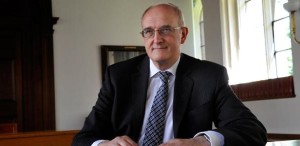I don’t know if British university vice-chancellors are really likely to follow the call from the Swiss lake district of Lausanne and ‘get out on the streets’ to defend the UK’s membership of the European Union – but at least they are stirring into some form of activity.
The call for street action came from Professor Philippe Moreillon, vice rector of research and international relations at University of Lausanne, (pictured above).
Speaking at the first of a series of debates about the UK’s EU referendum organised by Universities UK, he reminded everyone listening that his country’s higher education and research community suffered after a referendum in Switzerland narrowly voted to restrict free movement from other EU countries two years ago.
Not nice being ‘kicked-out’
Switzerland lost its associate membership of the EU and was ‘kicked-out’ of the Erasmus student mobility scheme and the incoming Horizon 2020 research programme.
Universities, like Laussane, had to re-design hundreds of agreements with partners in other European countries previously covered by bilateral arrangements through the EU.
Youth vote critical
“We did a bad job in Switzerland. Our rectors made several announcements in the press, but we didn’t get out on the streets and convince young people to vote.
“The lack of young people voting led to the very narrow shock defeat in the referendum and the loss of our associate membership of the EU”, said Prof Moreillon.
More than letter writing
So what are Universities UK and its vice-chancellor members doing? Well, they are keen newspaper letter writers and timed their latest, in the Sunday Times signed by 103 vice-chancellors, arguing firmly for Britain to remain without hours of Prime Minister David Cameron firing the starting-pistol in the referendum race.
They are also getting the debating bug.
This week they held their second open discussion, this one youth-focused on whether students should be bothered by the #EUref campaign.
It involved representatives from the National Union of Students, UKIP, a Tory MP from the Leave campaign and pro-EU Greens.
Quite lively it was, too, and I was pleased to see it being live-streamed and trending on twitter via #UnisforEU.
Lessons from Switzerland
The key lessons from the Swiss referendum for British universities according to Prof Moreillon, is to help mobilise the youth vote.
 The UK referendum on June 23 will come outside term time and apart from registering the many thousands of students who have been lost due to the new voter registration system is the need to encourage postal voting.
The UK referendum on June 23 will come outside term time and apart from registering the many thousands of students who have been lost due to the new voter registration system is the need to encourage postal voting.
Prof Moreillon urges his British counterparts to avoid negative campaigning and scare mongering and to focus on other things than the amount of research money universities will lose if the UK leaves the European Union.
Stay positive!
Emphasise the positives of belonging to a union of European nations and stress that the UK needs to be at the table when the European Union is working out how to deal with the big issues with global players like the USA and China, he urges.
So the arguments should be about more than what is good for universities.
“To appeal to young people it should focus on issues like peace and society,”
said the Swiss professor.
‘Inextricably linked to Europe’
One of the most powerful advocates of the UK staying in the EU is Sir Leszek Borysiewicz, Vice-Chancellor of Cambridge University.
He told Universities UK’s International Higher Education Forum this month: “No matter what Brexit campaigners would wish us to think, we are inextricably linked to Europe.
Special meaning
Professor Borysiewicz describes himself as ‘the literal embodiment of what that European ideal will allow’.
He said: “I am the British (or rather, Welsh) child of Polish refugees, I grew up in Cardiff, and I now find myself at the helm of a quintessentially British University seeking to maintain its competitiveness not only in the UK, or in Europe, but globally.
“I feel European to my very core.
“And my Britishness is as much a part of this feeling of belonging to Europe as is my Polish genetic background.”
More than about research money
While Professor Borysiewicz, like UniversitiesUK, and its International Unit, make great play of the grants British universities receive from the likes of the Horizon 2020 European research programme, there is a growing awareness that the referendum will not be won or lost on the size of European Research Council grants flowing into Britain.
I must admit I was a bit worried when Prof Borysiewicz started listing how well British ‘research-intensive universities’ had done from European engagement in cash terms!
But after a bit of boasting about the level of EU research money rolling in to some university coffers, he did thankfully move on and say there is a much more fundamental argument to be made in favour of our sector’s full engagement with the EU.
Freedom of mobility
He said: “Let’s consider how we have benefited from freedom of mobility within the EU: 200,000 UK students have studied and worked abroad through the Erasmus programme.
 “Studies show that students who have done Erasmus work or study placement are 50% less likely to experience long-term unemployment.
“Studies show that students who have done Erasmus work or study placement are 50% less likely to experience long-term unemployment.
“At a time when our recent graduates face such uncertainty in entering the job market, this fact alone ought to stiffen our resolve.
“We know that 15% of academic staff at UK universities is from other EU countries, and that over 125,000 EU students are currently studying at UK universities.
“The conclusion is clear. Excluding ourselves from a system that allows the mobility of staff and students, losing that ability to attract the brightest minds from our nearest-neighbouring countries and from our nearest collaborators, would impoverish us –in every sense.”
Well said Professor Borysiewicz!
Read his speech in full here.
• To stay in touch with the UK’s Universities for Europe campaign, see here.







